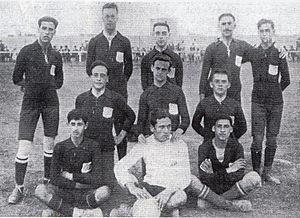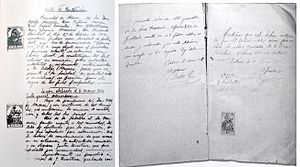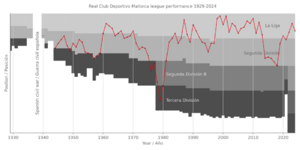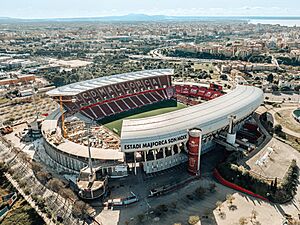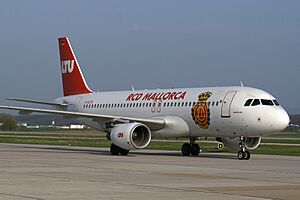RCD Mallorca facts for kids
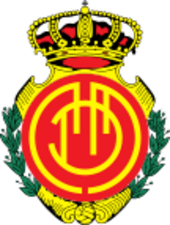 |
||||
| Full name | Real Club Deportivo Mallorca, S.A.D. | |||
|---|---|---|---|---|
| Nickname(s) | Los Piratas (The Pirates) Los Bermellones (The Vermilions) Els Barralets (The Barralet) |
|||
| Founded | 5 March 1916 as Alfonso XIII Foot-Ball Club | |||
| Ground | Estadi Mallorca Son Moix | |||
| Capacity | 25,800 | |||
| Owner | Andy Kohlberg (majority) Steve Nash (minority) Steve Kerr (minority) Stu Holden (minority) |
|||
| President | Andy Kohlberg | |||
| Head coach | Jagoba Arrasate | |||
| League | La Liga | |||
| 2022–23 | La Liga, 9th of 20 | |||
|
||||
Real Club Deportivo Mallorca, often called Real Mallorca or RCD Mallorca, is a professional football club from Palma, on the island of Mallorca in Spain. The club started on March 5, 1916. They play their home games at the Estadi Mallorca Son Moix, which can hold 23,142 fans.
Mallorca had its most successful period in the late 1990s and early 2000s. They finished third in La Liga (Spain's top football league) in 1999 and 2001. They won the Copa del Rey (a major Spanish cup) in 2003. They also won the 1998 Supercopa de España and reached the final of the 1999 UEFA Cup Winners' Cup final. Mallorca's team colors are red shirts, black shorts, and black socks.
Contents
Club History
How Mallorca Started
RCD Mallorca was founded on March 5, 1916. It was first known as Alfonso XIII Foot-Ball Club. Just weeks after starting, the club quickly formed its first leaders. Engineer Adolfo Vázquez Humasqué led a group of eight football fans.
Their first stadium was called Buenos Aires field. It opened with a match against FC Barcelona only 20 days after the club was officially registered. Mallorca lost that first game 8–0. Soon after, King Alfonso XIII himself asked for the club to add "Real" (Royal) to its name. So, it became Real Sociedad Alfonso XIII Foot-Ball Club.
In 1917, the Catalan Federation allowed Real Sociedad Alfonso XIII to join the second-tier league. They became the unofficial champions of the Balearic Islands. Mallorca reached the final and won their first title. They beat Futbol Club Palafrugell 3–1 in Barcelona.
Until the 1930s, the club played matches against teams from mainland Spain. These included RCD Espanyol and Real Murcia. They also hosted rare games against foreign teams. These included Ajax in 1923 and Uruguay's national team in 1925.
In 1931, Spain became a republic, and any mention of the monarchy was not allowed. So, the club changed its name to Club Deportivo Mallorca. The Spanish Civil War started in 1936 and stopped many major games. But football on the island continued, and the team won every championship they entered.
After the war, games with mainland teams started again. The Second Division was created with five groups of eight teams. On September 22, 1945, Mallorca moved to a new stadium called Es Fortí. It could hold 16,000 fans. The next day, Mallorca won their first game there 3–0 against Jerez. Carlos Sanz scored the first goal. The stadium was later renamed Lluís Sitjar, honoring the person who helped build it. In the 1949–1950 season, the club got its "Real" title back. It became Real Club Deportivo Mallorca.
Rising to La Liga (1960s-1980s)
On April 17, 1960, Mallorca beat Levante 2-1. This win meant they were promoted to La Liga for the first time. This was 44 years after the club started.
In their first season in La Liga (1960–61), Mallorca finished 9th out of 16 teams. They were knocked out of the Copa del Rey in the Round of 16. Mallorca was relegated back to the Segunda División in 1963. They finished 13th and lost to RCD Espanyol in the playoffs.
After winning the Segunda Division in 1965, they were relegated again in 1966. They finished 15th in La Liga. Mallorca spent a few more seasons in the Segunda Division. They finished in the top 5 each time. They were promoted again in the 1968–69 season, finishing 3rd.
However, Mallorca was relegated right away again in 1970. They finished 15th in La Liga. The club then stayed in the lower half of the Segunda Division. In the 1974–75 season, they finished 17th and were relegated to the Tercera División. They even fell further to the 4th division in 1978.
But these tough times did not last. Mallorca earned back-to-back promotions. They finished first in the 4th division in 1979–80. Then they won the Tercera División in 1980–81. Mallorca continued this good run. They were promoted back to La Liga after finishing third in the Segunda Division in 1983.
These good times ended quickly. Mallorca was relegated again in 1984, finishing 17th in La Liga. But once more, Mallorca bounced back. They finished 3rd in the Segunda Division in 1986. This earned them promotion to La Liga for the 1986–87 season.
Peak Years (1990s and 2000s)
In the 1990–91 season, Mallorca reached the Copa del Rey final for the first time. They lost 1–0 to Atlético Madrid.
Argentine coach Héctor Cúper joined the club in 1997. In his first season, Mallorca reached the 1998 Copa del Rey Final. They lost to FC Barcelona on penalties after a 1–1 draw. However, because Barcelona also won the league, Mallorca played them in the 1998 Supercopa de España. Mallorca won 3–1 overall, earning their first major trophy.
Barcelona's double win also meant Mallorca entered the 1998–99 UEFA Cup Winners' Cup. This was the last time this tournament was held. Mallorca lost the final 2–1 to Lazio.
In 1999, Mallorca also achieved their best-ever league finish, coming in 3rd place. This allowed them to qualify for the UEFA Champions League for the first time. However, they were knocked out by Molde FK of Norway before the group stage. In 2001, under coach Luis Aragonés, they again finished 3rd.
The 2001–02 season was difficult for Mallorca. They had three different coaches and finished 16th in the league. For the 2002–03 season, Gregorio Manzano became the manager. Mallorca finished ninth in the league. That season, Mallorca won their first Copa del Rey title. On their way to the final, they beat Real Madrid 4–0 in the quarterfinals. Then they defeated the defending champions, Deportivo de La Coruña. In the final on June 28, 2003, Mallorca beat Recreativo de Huelva 3–0. Walter Pandiani and Samuel Eto'o scored the goals.
Winning the Copa del Rey allowed Mallorca to play in the UEFA Cup. They advanced through three rounds before being eliminated by Newcastle. In the following seasons, the club usually finished in the middle of the league table. In the 2009–10 season, Mallorca had a great year. They finished 5th in La Liga and reached the Copa del Rey quarterfinals. However, they could not play in the Europa League because of financial problems.
Recent Years (2010s and 2020s)
Mallorca was relegated from La Liga on the last day of the 2012–13 season. In January 2016, with the team at risk of falling to the third division, American investor Robert Sarver and former NBA player Steve Nash bought the club.
On June 4, 2017, Mallorca dropped to the third division for the first time since 1981. But just one year later, they bounced back. They won the play-off final against CF Rayo Majadahonda in the 2017–18 season, under new manager Vicente Moreno.
In June 2019, Mallorca earned their second promotion in a row. They returned to La Liga after beating Deportivo de La Coruña 3–2 overall in the play-offs. They had lost the first game 2–0 but made a great comeback. However, they were relegated again a year later.
Another year later, Mallorca returned to the top league. This happened after Almería lost to Cartagena. In 2024, Mallorca reached the Copa del Rey final again. This was their first final since winning the competition in 2003.
Club Information
Stadium Details
- Name: Visit Mallorca Stadium
- City: Palma de Mallorca
- Capacity: 23,142 people
- Opened: June 1999
- Pitch size: 107 meters by 69 meters
- Other Facilities: Antonio Asensio Sports Complex (also known as "Son Bibiloni")
- Location: Visit Mallorca Stadium on Google Maps
Club Facts
- Members: 12,107 (as of 2020–21 season)
- Total Attendance in La Liga: 205,828 (2019–20 season)
- Average Attendance: 10,836 Spectators (2019–20 season)
- Official shirt maker: Nike
- Official shirt sponsors: αGEL
- Other sponsors: Coca-Cola, CaixaBank, Estrella Damm, PayPal, Fibwi, juaneda, Air Europa, Specialized Bicycle Components, okmobility, Alua Hotels & Resorts
Team Players
Current Squad
|
|
Reserve Team
|
|
Players on Loan
|
Club Management
Technical Staff
Last updated: 1 July 2024
Source: RCD Mallorca
Board of Directors
| Position | Staff |
|---|---|
| President | Andy Kohlberg |
| Board of Directors Member | Glenn Carlson |
| Sam Garvin | |
| Honorary Secretary | Rosemary Mafuz |
| Vice-secretary | Alfonso Díaz |
Sports Directors
| Position | Staff |
|---|---|
| CEO of Football | Pablo Ortells |
| Sports director | Sergio Marty |
| Technical secretary | Sergio Moya |
Club Presidents Through the Years
Real Sociedad Alfonso XIII Football Club
- Adolfo Vázquez Humasqué (1916)
- Antoni Moner (1916–19)
- Josep Ramis d'Ayreflor (1919–24)
- Antoni Moner (1924–26)
- Lluís Sitjar (1926–27)
- Sebastià Sancho (1927)
- Manuel Villalonga (1927–29)
- Josep Ramis d'Ayreflor / Sebastià Sancho (1929–30)
- Antonio Parietti / Lluís Sitjar (1930–31)
Club Deportivo Mallorca
- Lluís Sitjar / Josep Sancho / Ramón Cavaller (1931–32)
- Miquel Seguí (1932–34)
- Llorenç Lladó / Andreu Homar (1934–35)
- Andreu Homar (1935–43)
- Lluís Sitjar (1943–46)
- Félix Pons Marqués (1946–47)
Real Club Deportivo Mallorca
- Joaquín Fuster / Andreu Homar / Joan de Vidal (1948–51)
- Antoni Buades / Josep Tous (1951)
- Antoni Buades / José María del Valle (1952)
- Llorenç Munar (1955)
- Jaume Rosselló (1956–61)
- Llorenç Munar (1961)
- Joan de Vidal (1964–66)
- Josep Barona (1966–67)
- Josep Barona / Pau Servera (1967–68)
- Pau Servera / Guillem Ginard (1969–70)
- Guillem Ginard / Josep Fandós (1970–71)
- Josep Fandós (1971–72)
- Joan de Vidal (1972–74)
- Joan de Vidal / Antoni Seguí (1974–75)
- Antonio Seguí / Joan Ferrer (1975–76)
- Guillem Ginard (1976-77)
- Guillem Ginard / Miquel Contestí (1977–78)
- Miquel Contestí (1978–92)
- Miquel Dalmau (1992–95)
- Bartomeu Beltrán (1995–98)
- Guillem Reynés (1998–00)
- Mateu Alemany (2000–05)
- Vicenç Grande (2005–08)
- Mateu Alemany (2008–09)
- Tomeu Vidal (2009–10)
- Josep Maria Pons (2010)
- Jaume Cladera (2010–12)
Club Achievements
Spanish Competitions
- Copa del Rey
- Winners (1): 2002–03
- Runners-up (3): 1990–91, 1997–98, 2023–24
- Supercopa de España
- Winners (1): 1998
- Runners-up (1): 2003
- Segunda División (Second Division)
- Winners (2): 1959–60, 1964–65
- Play-off Winners (1): 2019
- Segunda División B (Third Division)
- Winners (2): 1980–81, 2017–18
European Competitions
- UEFA Cup Winners’ Cup
- Runners-up (1): 1998–99
Club Records
Team Records
- Best La Liga position: Third (1998–99, 2000–01)
- Biggest La Liga win: 7–1 against Recreativo de Huelva (at home), March 9, 2008
- Biggest La Liga defeat: 7–0 against Atlético Madrid (away), February 7, 1988
- Fastest goal: 22 seconds -
 Dani García vs Real Oviedo, February 21, 1999.
Dani García vs Real Oviedo, February 21, 1999. - Most goals scored in a season: 69 (2007–08)
Individual Player Records
Most Appearances
| # | Name | Matches |
|---|---|---|
| 1° | 419 | |
| 2° | 348 | |
| 3° | 333 | |
| 4° | 309 | |
| 5° | 282 | |
| 6° | 278 | |
| 7° | 272 | |
| 8° | 270 | |
| 9° | 263 | |
| 10° | 258 |
Top Scorers
| # | Name | Goals |
|---|---|---|
| 1° | 71 | |
| 2° | 70 | |
| 3° | 55 | |
| 4° | 53 | |
| 5° | 53 |
- Pichichi Trophy (Top Scorer Award)
- Ricardo Zamora Trophy (Best Goalkeeper Award)
World Cup Players
These players were chosen to play for their country in the World Cup while they were playing for Mallorca:
 Zoran Vulić (1990)
Zoran Vulić (1990) Iván Campo (1998)
Iván Campo (1998) Carlos Roa (1998)
Carlos Roa (1998) Albert Luque (2002)
Albert Luque (2002) Miguel Ángel Nadal (2002)
Miguel Ángel Nadal (2002) Samuel Eto'o (2002)
Samuel Eto'o (2002) Pierre Webó (2010)
Pierre Webó (2010) Liassine Cadamuro-Bentaïba (2014)
Liassine Cadamuro-Bentaïba (2014) Lee Kang-in (2022)
Lee Kang-in (2022) Predrag Rajković (2022)
Predrag Rajković (2022)
Affiliated Teams
See also
 In Spanish: Real Club Deportivo Mallorca para niños
In Spanish: Real Club Deportivo Mallorca para niños
 | Victor J. Glover |
 | Yvonne Cagle |
 | Jeanette Epps |
 | Bernard A. Harris Jr. |


